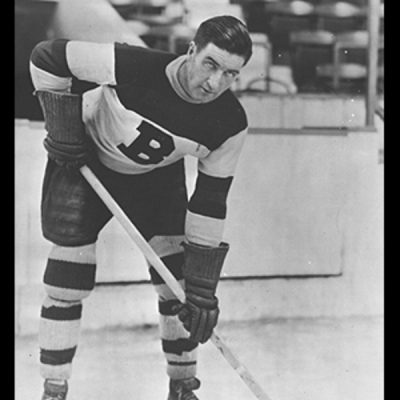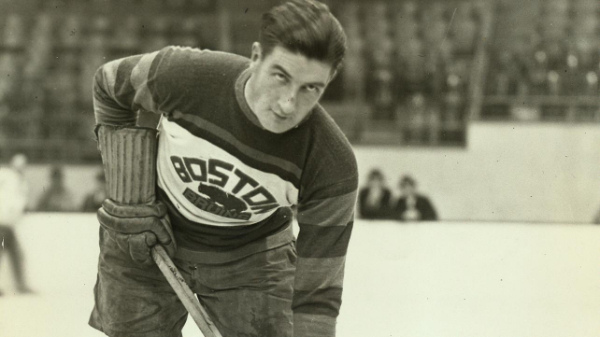
By: Andrew Lindroth | Follow me on Twitter! @andrewlindrothh
Marty Barry was born on December 8th, 1905, in Quebec City, Quebec, Canada. He began playing for various amateur teams in Montreal as an 18-year-old forward and did so from 1924-27. Barry suited up for the Montreal St. Anthony’s (MCHL), Montreal St. Ann’s (ECHL), and Montreal Bell Telephone (MCHL), and at the time had earned the nickname “goal-a-game Barry.”
Although the talented forward garnered the Montreal Canadiens and Montreal Maroons’ attention, both teams eventually passed on him as an option. Soon after, the New York Americans manager, Newsy Lalonde, contacted Barry and quickly signed the 22-year-old phenom. Barry was immediately given the opportunity to play his first NHL games at the start of the 1927 season, appearing in seven games and recording his first career NHL goal but failed to impress and was sent down to the Canadian-American Hockey League (Can-Am). The forward reported to the Philadelphia Arrows (Can-Am) for the remainder of the 1927-1928 season and finished with 11 goals and 70 PIM in 33 games.
The following season, Barry was moved to the New Haven Eagles (Can-Am) and went on to win the league’s scoring title with 19 goals and 29 points. Later in May of 1929, the Intra-League Draft occurred in the NHL, and the Boston Bruins claimed Barry from the Americans. From that point on, Barry would be absent only two games in the following ten seasons he played in the NHL.

Barry had a remarkable rookie season and was known as one of the most touted rookies in the league, racking up 18 goals and 33 points in 44 games for a Bruins team that set an NHL record for 38 wins in a 44-game season. The Bruins dominated their way to the Stanley Cup Final in 1930, with Barry scoring three goals to help eliminate the Maroons in the semi-finals but were defeated by the Montreal Canadians. Although the Bruins failed to capture the Stanley Cup, Barry led the league with six playoff points.
Barry became one of the Bruins’ most effective offensive tools over the next five seasons, leading the team in goals for three consecutive seasons from 1931-1934. He averaged 23 goals per season, combining for 129 goals scored as a Bruin. He was also the team’s leading point-scorer for three consecutive seasons from 1932-1935. Barry was also one of the team’s great leaders, and the Bruins declared him team captain in 1933. Barry appeared as a Bruin for one more campaign in 1934-1935 before being packaged up for a blockbuster trade sending the 30-year-old forward and Art Giroux to the Detroit Red Wings in exchange for Cooney Weiland and Walt Buswell in May of 1935.
Barry played on Detroit’s top scoring-line centering between wingers Herbie Lewis and Larry Aurie. They were one of the most offensively productive lines in the league, and Barry also finished third in the league in scoring that season with 21 goals and 40 points. He led the Red Wings to a Stanley Cup victory in 1936, defeating the Toronto Maple Leafs in game four. Barry managed nearly a point-per-game streak during his seven-game playoff run.

The following season, Barry and the Detroit Red Wings continued to dominate the NHL, with the center finishing third in the league with 44 points in 47 games. Barry was also named to the NHL First All-Star Team and won the Lady Byng Trophy as the league’s most gentlemanly player with a higher standard of playing. He again led the team to another Stanley Cup victory and played a significant role in their team’s success. He also led the entire league in scoring during the playoffs with 11 points in ten appearances.
The next two seasons, Barry appeared in 96 games and recorded 21-48-69 numbers with Detroit until the 34-year-old forward was acquired by the Montreal Canadiens. However, he would play only 30 games with Montreal until the team released him from his contract. Barry then signed with the Pittsburgh Hornets (IAHL) to finish the 1939-1940 season. He played one more season, serving as a player-coach for the Minneapolis Millers (AHA) before officially retiring from the hockey world in 1941.
Throughout his 12-year tenure in the NHL, Barry recorded 194-193-387 numbers in 507 games. The two-time Stanley Cup champion was a phenomenal player for the Bruins and played a central role in the Detroit Red Wing’s back-to-back Stanley Cup success. Barry was inducted into the Hockey Hall Of Fame in 1965. Marty Barry passed away in his home on August 20th, 1969 at the age of 63.


Leave a Reply